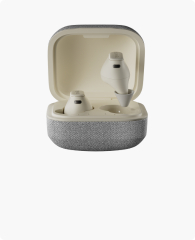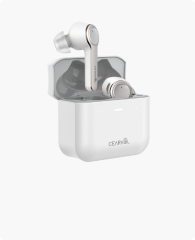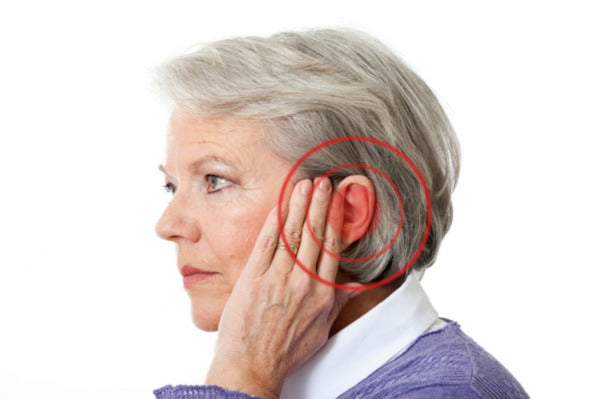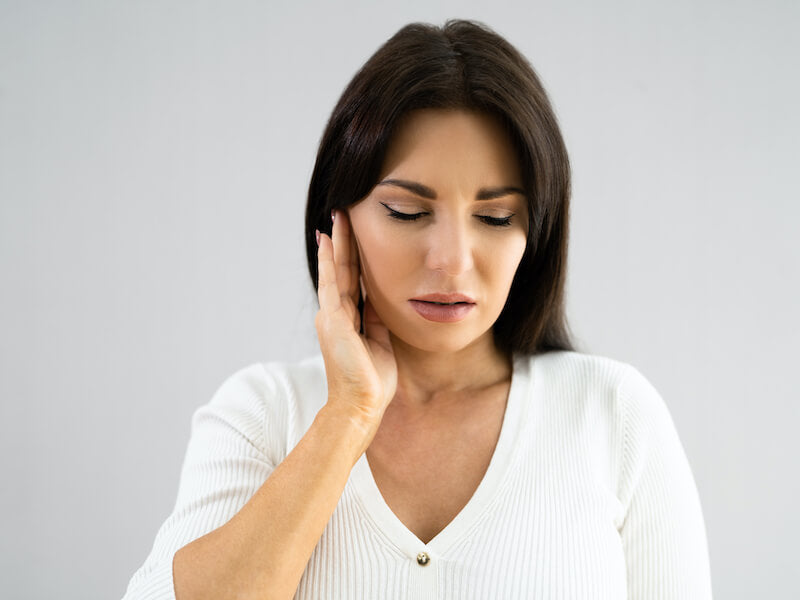Have you ever laid in bed at night, everything around you perfectly quiet—only to hear a steady "whoosh-whoosh" or "thump-thump" in your ear, like your heartbeat is echoing inside your head?
You're not imagining it. And you're certainly not alone.
As someone who's worked with many older adults dealing with hearing challenges, I can tell you this pulsing sensation—what we call pulsatile tinnitus—is more common than most people think. It's not the typical high-pitched ringing you may associate with tinnitus. Instead, it's rhythmic, often in sync with your pulse, and it can be especially noticeable at night.
This article is for you if you've ever asked:
- "Why do I feel a pulse in my ear?"
- "How do I stop pulsing in the ear at night?"
- "Is this dangerous?"
We're going to walk through what pulsatile tinnitus is, what causes it, and most importantly—how to stop pulsing in the ear safely and naturally.
🚀 Navigate This Post
You may also be interested in:
- Noise in Ears But Not Tinnitus? Causes, Treatments, and What to Do Next
- Right Ear Ringing Meaning: Is It a Medical Alarm — or Something More Spiritual?
- Pinched Nerves and Tinnitus - Is Your Neck Secretly Causing That Ear‑Ring?
Part 1: What Is Pulsatile Tinnitus?
Before we dive into solutions, let's talk about what this condition actually is.
1. It's Not "Just" Tinnitus
Regular tinnitus is usually described as a ringing, buzzing, or hissing sound in the ears. But pulsatile tinnitus is different. The sound pulses in rhythm with your heartbeat. Some people describe it like a soft drumbeat, a throbbing noise, or even a swishing of blood. It's often caused by changes in blood flow near the ears or problems with blood vessels, not necessarily by hearing damage itself.
If you've been wondering how to stop pulsing in the ear, understanding the root cause is the first step.
👉 For a deeper look at how your hearing is connected to other parts of the body like your circulatory system and balance, you might enjoy this article on Hearing and Balance.

2. It's Common in Older Adults
As we age, our blood vessels may become less flexible, or blood pressure may fluctuate—both of which can make this rhythmic sound more noticeable. Hearing loss itself may also make internal body sounds (like blood flow) more obvious, especially in quiet environments.
In fact, I've had patients who didn't notice their pulsatile tinnitus until their other hearing issues became more noticeable. If this is your case, don't worry—many people manage it successfully.
3. It's Often Treatable or Manageable
The good news? In many cases, pulsatile tinnitus is not dangerous, and it can be managed. We'll get into several effective strategies soon, including small daily changes and supportive hearing devices.
And for those with mild to moderate hearing loss, one simple solution some of my patients have found helpful is trying discreet OTC hearing aids—like the Cearvol Diamond X1. These aids don't just improve hearing—they can also reduce awareness of internal sounds by gently amplifying natural ambient noise.
Part 2: Why Pulsatile Tinnitus Feels Worse at Night?
Have you ever noticed that the pulsing sound in your ear seems to get louder the moment you lie down for bed?
You're not imagining it—and you're definitely not alone. Many of my older clients say the exact same thing:
"It doesn't bother me much during the day, but at night, it's all I can hear."
Let me explain why this happens and what you can do about it.
1. Your World Gets Quieter, So the Noise Gets Louder
During the day, there's a steady stream of background noise: traffic, conversation, birds, the TV. Your brain naturally tunes out internal sounds like pulsatile tinnitus.
But once it's quiet—especially in the stillness of night—your ears pick up on everything, including the faint pulsing of blood vessels near your ear. That's when you start wondering how to stop pulsing in ear at night.

👉 Tip: Adding soft background sound at night can help. Many people find comfort using gentle white noise or nature sounds. You can explore the pros and cons in our guide to White Noise vs Green Noise.
2. Lying Flat Can Increase Pressure
When you lie down, blood flow patterns shift slightly, and this can amplify the sound of your pulse—especially if your head is level with your heart. For some, that's all it takes to make the sound feel louder and more intrusive.
Try elevating your head with an extra pillow. Some people also find relief sleeping slightly on their side rather than flat on their back.
3. Stress and Fatigue Amplify the Sensation
Nighttime is when we often reflect on the day—and sometimes worry. Stress increases your awareness of bodily sensations. That little "thump" in your ear can suddenly feel like a drum.
I always recommend creating a relaxing bedtime routine, especially for older adults dealing with hearing issues. Think gentle stretching, a warm cup of decaf tea, or listening to something calming.
And remember: you're not just managing noise—you're caring for your whole self.
Part 3: What Causes Pulsatile Tinnitus?
So now that we know pulsatile tinnitus feels worse at night—what's actually causing it in the first place?
As a hearing care expert who's helped hundreds of seniors navigate mysterious ear symptoms, I always tell people this:
That pulsing sound is rarely random—your body is trying to tell you something.
Let's go over the most common causes, one by one.
1. Blood Flow Near Your Ear
The most frequent cause of pulsatile tinnitus is turbulent or increased blood flow near the structures around your ear.
You may have a blood vessel that's just a little too close to your auditory system. When blood flows through it quickly—or if the vessel wall is slightly stiff or narrowed—you can actually "hear" your pulse inside your ear.
This is especially common in older adults due to changes in vascular elasticity.

2. Conductive Hearing Loss
When you have conductive hearing loss—where sound struggles to pass through the outer or middle ear—your own internal sounds can become more noticeable. That includes blood flow, muscle movement, even your breathing.
This is one reason some people with hearing loss report a "whooshing" or heartbeat in the ear and ask how to stop pulsing in the ear naturally.
👉 You can learn more about these types of hearing loss in our guide to Conductive Hearing Loss.
3. Ear Infections or Fluid Buildup
Sometimes, middle ear infections or fluid trapped behind the eardrum can amplify the pulsing sensation.
If the noise feels one-sided, fluctuates, or worsens with head movement, fluid pressure might be a factor. Luckily, this kind of pulsatile tinnitus often resolves once the underlying issue clears up.
4. Other Medical Conditions
Certain health issues like anemia, thyroid problems, or even diabetes can affect circulation and ear health.
That's why I often encourage people not to ignore the pulsing, especially if it's new, worsening, or accompanied by other symptoms like dizziness or fatigue.
👉 Here's a helpful read if you have both blood sugar concerns and tinnitus: Diabetes and Tinnitus
Part 4: How to Stop Pulsing in the Ear?
Now that we've explored what causes pulsatile tinnitus, let's talk about what you really want to know: How do I stop this pulsing sound in my ear—especially at night, when it's the worst?
Here are the most effective, expert-approved strategies I recommend to my senior clients. Many of these can be done right at home, starting tonight.
1. Improve Your Sleeping Position
If your pulsatile tinnitus gets worse in bed, changing your sleep setup might help more than you expect.
✅ Try these adjustments:
- Elevate your head slightly using 1–2 pillows
- Sleep on your back or opposite ear
- Avoid tight neck positions that may compress blood vessels
These small changes can make a big difference in reducing nighttime pulsing.

2. Add Gentle Background Noise
When everything's silent, even the faintest pulse can sound loud. That's why using low-level background noise—like a white noise machine or nature sounds—can help you stop noticing the pulsing in your ear at night.
This approach is especially useful if you're lying awake wondering, how to stop pulsing in ear at night?
Try:
- Rainfall or ocean waves from a speaker
- Soft instrumental music on low volume
- "Green noise" (a more soothing alternative to white noise)
3. Manage Your Blood Pressure Naturally
Since pulsatile tinnitus often relates to blood flow, one of the best long-term solutions is managing blood pressure.
If you're not already monitoring it, talk to your doctor about starting. Daily walks, limiting salt, and staying hydrated all help. And remember: keeping your heart healthy helps your hearing, too.
4. Try OTC Hearing Aids to Mask the Sound
For many older adults with mild to moderate hearing loss, using hearing aids can reduce the intensity of internal noises like pulsatile tinnitus. By amplifying ambient sound, your brain stops focusing on the pulse.
One model I've seen work particularly well for this purpose is the Cearvol Diamond X1 Rechargeable Hearing Aids.
They're comfortable, discreet, and ideal for seniors who prefer a non-prescription option. Several of my patients reported they noticed less nighttime pulsing after wearing them regularly.

Diamond X1 - Best Hearing Aids with Bluetooth
Newcomer Price
$249.99 $309.99
- ✔ Adaptive sound modes for clear hearing.
- ✔ Bluetooth for calls & streaming.
- ✔ App-controlled, customizable adjustments.
- ✔ Rechargeable & fast charging.
- ✔ Ideal for mild to moderate hearing loss.
5. Reduce Stress Before Bed
Stress makes everything feel louder—including your own pulse.
If you're lying awake Googling how to stop pulsing in the ear?, it may be time to reset your routine:
- Gentle breathing exercises
- Light stretching or meditation
- Avoid screens at least 30 minutes before bed
Give yourself permission to unwind.
6. Check for Earwax Buildup
Sometimes the simplest cause of pulsatile tinnitus is just… earwax.
Yes, really.
When wax blocks the ear canal, it can create an echo chamber effect, making internal sounds like your pulse much more noticeable. That's why one of the first things I check with patients is whether their ears are clear. Avoid cotton swabs deep in the ear—stick to warm water rinses or drops unless your doctor says otherwise.
👉 Here's how to safely manage it: How to Clean Ears
7. Use a Warm Compress on the Neck or Jaw
I know it sounds old-fashioned, but a warm towel or compress placed gently on your neck (especially behind the jaw near the ear) can help relax blood vessels and muscles that may be contributing to the pulsing.
Try this before bed, especially if your pulsatile tinnitus feels stronger when you're stressed.
8. Keep a "Pulsing Diary"
Sometimes patterns reveal solutions.
Ask yourself:
- Does it happen more on some days than others?
- After caffeine, wine, or salty food?
- After stressful conversations or TV shows?
Write it down for a week. You might spot something. And if you ever need to speak to your doctor, this log will be incredibly helpful.
9. Stay Hydrated Throughout the Day
Dehydration can thicken your blood and increase vascular tension, which may worsen pulsatile tinnitus.
Many older adults unintentionally drink too little water. Set reminders or use a marked water bottle to ensure you're getting enough fluids—especially if you're taking diuretics or medications for high blood pressure.
10. Avoid Stimulants Like Caffeine and Nicotine
These substances can raise your heart rate and blood pressure, both of which may intensify the pulsing sound. Try switching to herbal tea or decaf coffee in the afternoon, especially if your symptoms peak at night.
If you're wondering how to stop pulsing in ear naturally, skipping that 4pm espresso could be a surprisingly good start.

Part 5: When to See a Doctor About Pulsatile Tinnitus
If the pulsing sound in your ear isn't going away—or is starting to get worse—it's a good idea to talk to a doctor.
Here's when you shouldn't wait:
-
It only happens in one ear
Unilateral pulsing may point to an issue with blood vessels or ear structure. -
You feel dizzy or off balance
This may signal a problem with your inner ear or hearing nerves. -
The sound gets louder or keeps you from sleeping
If it's affecting your daily life, don't ignore it. -
You recently had a head injury or sudden hearing change
That always deserves a medical check-up.
Conclusion: You're Not Alone—and Relief Is Possible
Pulsatile tinnitus can be frustrating, especially at night. But with small changes—like adjusting sleep posture, reducing stress, or using gentle sound—you may find real relief.
And if hearing loss is part of the problem, a good OTC hearing aid may help mask the internal sounds.
So if you're still wondering how to stop pulsing in ear, remember this:
You're not stuck with it. Help is available—and your hearing health is worth caring for.








Leave a comment
All comments are moderated before being published.
This site is protected by hCaptcha and the hCaptcha Privacy Policy and Terms of Service apply.